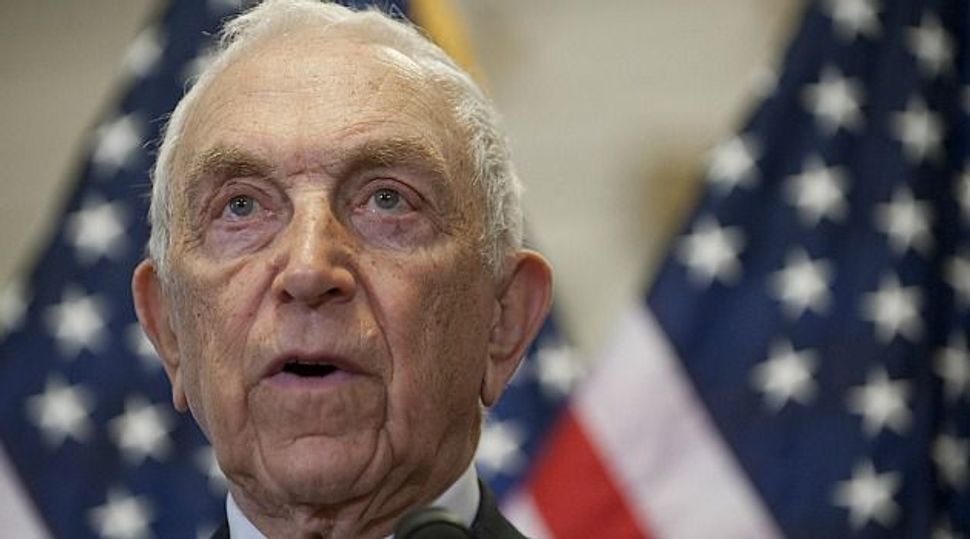Chris Christie’s Controversial Special Election for Frank Lautenberg’s Seat

Image by getty images
New Jersey Gov. Chris Christie on Tuesday called a special election for October to fill the U.S. Senate seat vacated by the death of Sen. Frank Lautenberg, a decision seen as critical to the balance of power in the U.S. Congress and to Christie’s own political aspirations.
Lautenberg, a liberal Democratic voice in the U.S. Senate since 1982, died on Monday at age 89 of complications from viral pneumonia.
Any move by Christie on how to handle the empty seat was coming under close scrutiny, as the outspoken New Jersey Republican is widely seen as interested in running for his party’s presidential nomination in 2016.
Christie could have chosen to fill the seat through 2014, when Lautenberg’s term was set to expire, most likely with a fellow Republican.
Instead he said a special election will be held on Oct. 16, preceded by a primary election on Aug. 13 to pick the Republican and Democratic nominees.
Like Christie, a blunt-talking politician who at times has alienated his own party as much as his Democratic opponents, the decision might leave both sides less than pleased.
Some Democrats might have liked to see Christie hold the special election on the same day as the Nov. 5 general election, when Christie is up for reelection, as that might lure more Democrats to the polls. Many Republican could have preferred he fill the seat with a Republican through 2014.
“I’m not going to play politics with this,” Christie, who is seeking re-election as governor this November, told a news conference at his office in Trenton, N.J. “I want to have an elected senator as soon as possible.”
Christie said he would pick someone within the week to fill the vacant seat until the Oct. 16 special election.
The state of New Jersey will bear the cost of the primary and special election, Christie said.
Opponents promptly took issue with his decision to hold the special election just three weeks ahead of the general election.
Political observers have said Christie might want to avoid having the special election on the day of the general election to avoid a high Democratic turnout.
As a potential presidential contender, Christie would want to present himself to the nation with the strongest possible backing in his home state, some observers say.
Among those likely interested in succeeding Lautenberg is Newark Mayor Cory Booker. A potential run by Booker, a popular black rising star in the Democratic Party, could bring out a strong minority voter turnout.
New Jersey Senate President Steve Sweeney, a Democrat, said he was pleased that Christie did not opt to fill the vacant seat through 2014 but said in a statement: “That being said, it certainly would have been more rational to hold the election in November instead of October.”
In a more strongly worded statement, Democratic Assembly Speaker Sheila Oliver said she was disappointed that Christie “has chosen to be so transparently political and waste taxpayer money” on a special October election.
“The November general election date is what’s best for taxpayers and voter turn-out … but Gov. Christie has chosen to put partisan politics and his self-interest first,” she said.
In Washington, Democrats and Republicans anxiously watched Christie’s announcement, knowing its likely impact on the balance of power in the Senate, now held by Democrats, 54-45, with one vacancy.
“I’m happy with what he’s done,” said Senate Democratic Leader Harry Reid, whose party will likely get the seat back in the October election. “I think he did the right thing.”
Senate Republican Leader Mitch McConnell said he accepted Christie’s decision, although it will likely prevent his party from holding the seat through 2014.
“I’m sure that the governor exercised whatever option he had in the best interest of his state,” McConnell said. “I won’t question the path that he has chosen.”
Christie said that under New Jersey law, he could have named someone to fill the remainder of Launtenberg’s term through 2014, but he chose not to do so.
“I firmly believe that the decisions that need to be made in Washington are too great to be determined by an appointee for a period of 18 months,” he said.
There had been speculation that Christie might appoint a Republican who would help boost his standing in his party or he could select someone willing to cooperate with Obama and broaden his bipartisan appeal.
Christie and Obama worked amicably together during the 2012 White House race when Obama helped the governor get federal aid after Superstorm Sandy slammed into New Jersey.
Christie said the primary process will give voters a choice.
“I will not permit the insiders and a few party elites to determine who the nominee of the Republican Party and the Democratic Party will be,” he said. “A primary election is necessary. The people must choose.”
The New Jersey Office of Legislative Services has estimated that holding a primary and a special election to fill the U.S. Senate vacancy would cost approximately $11.9 million for each election, according to a spokesman for state Assembly Democrats.



















